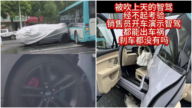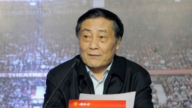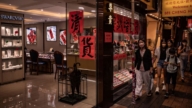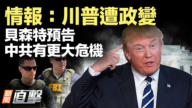【新唐人2012年7月9日讯】中共国家主席胡锦涛日前在北京举行的“全国科技创新大会”上说,“到2020年,中国要进入创新型国家行列。”评论指出,胡锦涛的这番话,实际上反映了:以前靠加工和出口的中国经济模式已经陷入死局,但要想学西方发达国家以技术创新来刺激经济,在中国这个大的政治环境下不可能实现,因为创新需要自由,而中共政权要求老百姓像奴隶一样对它唯唯诺诺的服从,评论认为,受控制的奴隶永远不能创新。
除了胡锦涛期待中国未来走入创新型国家行列,中共总理温家宝也在7月7号的会议上表示,“如果能在‘中国制造’前面再加上‘中国设计’,中国的经济和产业格局就会发生根本性变化。”
但,中国大陆目前经济处于艰难状态,前期靠出口,靠附加价值的加工制造业模式,早已经失去优势。
评论人士杰森分析说,创新所需要的民主法制社会环境和政治环境,在中国不存在,因此中国做不到经济转型。
评论员杰森:“中国为什么长期做不到经济转型呢﹖他主要是中国这个社会环境造成的,比如,中国对知识产权的淡漠,在中国真的做研发的企业是很倒霉的,因为你研发出来的东西很快就被山寨了,被模仿了。而且本身社会的发展方向全部都是官员决定社会发展方向,官本位的运作方式也造成了中国的创新实际上也是被中国的政治大环境所压抑。”
中国问题研究人士何岸泉也认为,中共六十多年来一党专政的政治制度和教育模式,压抑了每个社会个体发挥他们的聪明才智。他说,中国“要进入创新国家行列”的目标不可能实现,只能算是一种政治宣传。
中国问题研究人士何岸泉:“从六年小学,中学,大学我们受到的是什么样的教育,是压抑式的教育,规定的对标准答案的教育,他们这种教育模式实际上是让一个人变成一个机器上的螺丝钉,这是毛泽东时代,现在的教育同样是沿袭了以前毛泽东时代的教育,让你背标准答案,抹杀你个人的创造发挥,发出同样一个声音。”
据了解,中国大陆,很多大学教授早已经放弃了没钱可图的科研,他们更多关注的是如何上马一些短期的,立刻能拿到钱的项目。一些“海龟”派技术精英也在国内受到压抑而无法施展才华。2009年9月17号,浙江大学“海龟”博士涂序新跳楼自杀,他在遗书中表示后悔回国,并写道:国内学术圈的现实:残酷、无信、无情。却因他的自以为是而忽视。
何岸泉:“因为这个国家是权力关系,处处充满权力,一个科研人员你必须花大把时间去拉拢上级,去经营关系,而不是经营科研,在这种情况下不可能出来科研结果。这个环境是权力游戏,是拉帮结派的社会。”
何岸泉进一步分析说,中共政权要求老百姓像奴隶一样对它唯唯诺诺的服从,又希望老百姓有非常强的独立思考能力,有打破常规的创新能力,这是不可能出现的。杰森也指出,奴隶是永远不能创新的,因为奴隶的思维是被控制的。
采访/李倩倩 编辑/许旻 后制/萧宇
Critics: Slaves No Way to Create an Innovative China
At the National Science & Technology Innovation
Conference, the Chinese Communist Party President Hu said,
“China aims to be ranked as one of the innovative
countries by 2020."
Commentators say, Hu’s talk showed that China’s economy,
which in the past heavily relied on the export of processing, has gone dead in the water.
While Western style technological innovation is not
likely to be realized in China under the CCP’s political system.
This is because freedom is a must for carrying out
innovation.
In contrast, the regime requires that people
be like obedient slaves.
While slaves under control can never be innovative,
said critics.
Hu Jintao’s expectation was also reflected by the CCP’s
premier Wen Jiabao, who said at a meeting held on July 7,
“If the ‘made-in-China’ products can be prefixed with
‘designed in China’,
the shape of the Chinese economy and industry
will change fundamentally.”
However in reality, mainland China’s economy is
undergoing hard times.
The export of material and export of processing industry
have lost their competitive edge already.
Critic Jason Ma points out that China lacks a democratic
justice system and a political setting that are necessary to realizing innovation.
So economic restructuring will not
happen in China, he says.
Jason Ma: “Why has China been unable to restructure
its economy over the past years?
It was mainly caused by the domestic social environment.
For example, the ignorance of intellectual property rights.
In China, the enterprises that truly conduct R & D suffer
a lot, and replicas of your product will quickly be produced.
Where society is headed is decided by officialdom, so
China’s innovation is actually suppressed by its politics."
He Anquan, scholar for China studies, says that
over decades, the CCP’s one-party establishment and
educational system have prevented social units from using talent.
He thinks there is no way for China to truly realize the goal,
‘of being ranked as one of the innovative nations’, this is just propaganda.
He Anquan: “Since the 1960s during the Mao Zedong era,
all the education we received was a spiritually
oppressive education. It was an answer-standard education.
This actually turns a person into a machine screw.
It is the same case with today’s education in China.
Students are required to memorize standard answers,
and their creative potential is stifled."
Many university professors in China have reportedly
given up unprofitable scientific research,
but are turning to projects that can attract funds immediately
or in the short term.
Some overseas student elites were found to have been
prevented from using their talents after they returned to China.
A returned overseas Ph.D graduate Tu Xuxin,
jumped from a building in September 2009.
Tu felt regret at returning to China in his suicide note, saying,
“The reality of domestic academic circles: cruelty, no trust,
and heartlessness, but this has been ignored."
He Anquan: “Because this country is filled with power.
A researcher has to fawn on his superior, to establish
underlying connections, instead of doing research.
In this case, it’s impossible to make breakthroughs
in his researches.
The environment (in China) has become a society of
playing a power game and of cronyism."
He Anquan adds that the CCP requires slavish obedience
from the people,
but also wants them to have strong thinking and
capability for innovation, which is impossible.
Jason Ma also remarks that slaves can never be innovative,
this is because their thoughts are under control.






























